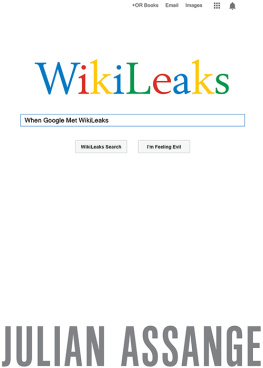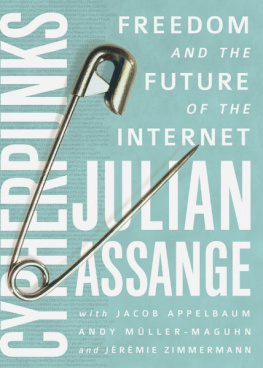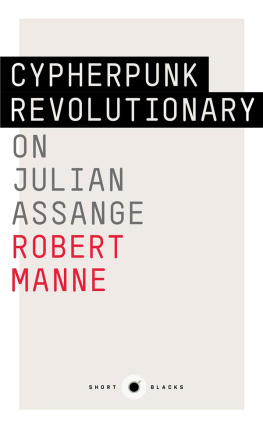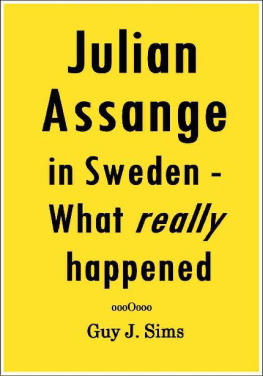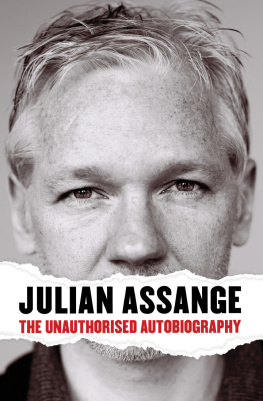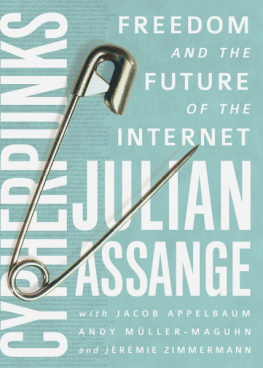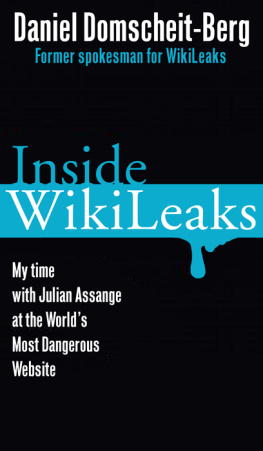Assange Julian - When Google Met WikiLeaks
Here you can read online Assange Julian - When Google Met WikiLeaks full text of the book (entire story) in english for free. Download pdf and epub, get meaning, cover and reviews about this ebook. City: New York;London;England, year: 2014, publisher: OR Books, genre: Politics. Description of the work, (preface) as well as reviews are available. Best literature library LitArk.com created for fans of good reading and offers a wide selection of genres:
Romance novel
Science fiction
Adventure
Detective
Science
History
Home and family
Prose
Art
Politics
Computer
Non-fiction
Religion
Business
Children
Humor
Choose a favorite category and find really read worthwhile books. Enjoy immersion in the world of imagination, feel the emotions of the characters or learn something new for yourself, make an fascinating discovery.
- Book:When Google Met WikiLeaks
- Author:
- Publisher:OR Books
- Genre:
- Year:2014
- City:New York;London;England
- Rating:3 / 5
- Favourites:Add to favourites
- Your mark:
- 60
- 1
- 2
- 3
- 4
- 5
When Google Met WikiLeaks: summary, description and annotation
We offer to read an annotation, description, summary or preface (depends on what the author of the book "When Google Met WikiLeaks" wrote himself). If you haven't found the necessary information about the book — write in the comments, we will try to find it.
When Google Met WikiLeaks — read online for free the complete book (whole text) full work
Below is the text of the book, divided by pages. System saving the place of the last page read, allows you to conveniently read the book "When Google Met WikiLeaks" online for free, without having to search again every time where you left off. Put a bookmark, and you can go to the page where you finished reading at any time.
Font size:
Interval:
Bookmark:

In June 2011, Julian Assange received an unusual visitor: the chairman of Google, Eric Schmidt, arrived from America at Ellingham Hall, the country residence in Norfolk, England where Assange was living under house arrest.
For several hours the besieged leader of the worlds most famous insurgent publishing organization and the billionaire head of the worlds largest information empire locked horns. The two men debated the political problems faced by society, and the technological solutions engendered by the global networkfrom the Arab Spring to Bitcoin. They outlined radically opposing perspectives: for Assange, the liberating power of the Internet is based on its freedom and statelessness. For Schmidt, emancipation is at one with US foreign policy objectives and is driven by connecting non-Western countries to Western companies and markets. These differences embodied a tug-of-war over the Internets future that has only gathered force subsequently.
When Google Met WikiLeaks presents the story of Assange and Schmidts encounter. Both fascinating and alarming, it contains an edited transcript of their conversation and extensive, new material, written by Assange specifically for this book, providing the best available summary of his vision for the future of the Internet.

2014 Julian Assange
Published by OR Books, New York and London
Visit our website at www.orbooks.com
First printing 2014
All rights reserved. No part of this book may be reproduced or transmitted in any form or by any means, electronic or mechanical, including photocopy, recording, or any information storage retrieval system, without permission in writing from the publisher, except brief passages for review purposes.
Cataloging-in-Publication data is available from the Library of Congress.
A catalog record for this book is available from the British Library.
ISBN 978-1-939293-57-2 paperback
ISBN 978-1-939293-58-9 e-book
For my family, whom I love and miss very much
Headbone connected to the headphones
Headphones connected to the iPhone
iPhone connected to the Internet
Connected to the Google
Connected to the government
MIA, The Message
Eric Schmidt is an influential figure, even among the parade of powerful characters with whom I have had to cross paths since I founded WikiLeaks. In mid-May 2011 I was under house arrest in rural Norfolk, about three hours drive northeast of London. The crackdown against our work was in full swing and every wasted moment seemed like an eternity. It was hard to get my attention. But when my colleague Joseph Farrell told me the executive chairman of Google wanted to make an appointment with me, I was listening.
In some ways the higher echelons of Google seemed more distant and obscure to me than the halls of Washington. We had been locking horns with senior US officials for years by that point. The mystique had worn off. But the power centers growing up in Silicon Valley were still opaque and I was suddenly conscious of an opportunity to understand and influence what was becoming the most influential company on earth. Schmidt had taken over as CEO of Google in 2001 and built it into an empire.
I was intrigued that the mountain would come to Muhammad. But it was not until well after Schmidt and his companions had been and gone that I came to understand who had really visited me.
***
The stated reason for the visit was a book. Schmidt was penning a treatise with Jared Cohen, the director of Google Ideas, an outfit that describes itself as Googles in-house think/do tank. I knew little else about Cohen at the time. In fact, Cohen had moved to Google from the US State Department in 2010. He had been a fast-talking Generation Y ideas man at State under two US administrations, a courtier from the world of policy think tanks and institutes, poached in his early twenties. He became a senior advisor for Secretaries of State Rice and Clinton. At State, on the Policy Planning Staff, Cohen was soon christened Condis party-starter, channeling buzzwords from Silicon Valley into US policy circles and producing delightful rhetorical concoctions such as Public Diplomacy 2.0.
It was Cohen who, while he was still at the Department of State, was said to have emailed Twitter CEO Jack Dorsey to delay scheduled maintenance in order to assist the aborted 2009 uprising in Iran. His documented love affair with Google began the same year, when he befriended Eric Schmidt as they together surveyed the post-occupation wreckage of Baghdad. Just months later, Schmidt re-created Cohens natural habitat within Google itself by engineering a think/do tank based in New York and appointing Cohen as its head. Google Ideas was born.
Later that year the two co-wrote a policy piece for the Council on Foreign Relations journal Foreign Affairs, praising the reformative potential of Silicon Valley technologies as an instrument of US foreign policy. Schmidt and Cohen claimed that
Democratic states that have built coalitions of their militaries have the capacity to do the same with their connection technologies.... They offer a new way to exercise the duty to protect citizens around the world [emphasis added].
In the same piece they argued that this technology is overwhelmingly provided by the private sector.
In February 2011, less than two months after that article was published, Egyptian president Hosni Mubarak was ousted by a popular revolution. Egypt had been a US client, its military dictatorship propped up by Washington to support Americas geopolitical interests in the region.
Under the surface, as a close reading of its internal cable traffic shows, the State Department had for years bet on both horses, supporting and co-opting elements of Egyptian civil society even as it helped to keep Mubarak in power. But when the US establishment realized that Hosni was on the way out, it scrambled for alternatives. It first tried to elevate its secretly preferred successor, Omar Suleimanthe much-hated domestic intelligence chief. But the State Departments own diplomatic correspondence from Cairo, which we were publishing in volume at the time, provided a frank appraisal of his background. Suleiman was Egypts torturer in chief, the CIAs main man in Egypt, and Israels approved choice for Mubaraks replacement.
Suddenly everyone wanted to be at the intersection point between US global power and social media, and Schmidt and Cohen had already staked out the territory. With the working title The Empire of the Mind, they began expanding their article to book length, and sought audiences with the big names of global tech and global power as part of their research.
They said they wanted to interview me. I agreed.
A date was set for June.
***
By the time June came around there was already a lot to talk about. That summer WikiLeaks was still grinding through the release of US diplomatic cables, publishing thousands of them every week. When, seven months earlier, we had first started releasing the cables, Hillary Clinton had denounced the publication as an attack on the international community that would tear at the fabric of government. She was, in a way, right.
In many countries, the fabric Clinton referred to had been woven from lies: the more authoritarian the country, the bigger the lies. The more a power faction relied on the US to prop up its power, the more it whispered into American ears about its factional rivals. This pattern was repeated in capital cities all over the world: a capricious global system of secret loyalties, owed favors, and false consensus, of saying one thing in public and the opposite in private. The scale and geographic diversity of our publications overwhelmed the State Departments ability to handle the crisis. Threads between players snapped, leaving gaps through which decades of resentment would pour.
Font size:
Interval:
Bookmark:
Similar books «When Google Met WikiLeaks»
Look at similar books to When Google Met WikiLeaks. We have selected literature similar in name and meaning in the hope of providing readers with more options to find new, interesting, not yet read works.
Discussion, reviews of the book When Google Met WikiLeaks and just readers' own opinions. Leave your comments, write what you think about the work, its meaning or the main characters. Specify what exactly you liked and what you didn't like, and why you think so.

